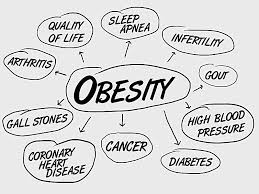Facts
Obesity often results from taking in more calories than are burned by exercise and normal daily activities.
Obesity occurs when a person's body mass index is 30 or greater.
The main symptom is excessive body fat, which increases the risk of serious health problems.

Some health concerns related to Obesity are but not limited to ...
As a person's BMI increases, so do the number of sick days, medical claims and healthcare costs. For instance:
- Obese adults spend 42 percent more on direct healthcare costs than adults who are a healthy weight.
- Per capita healthcare costs for severely or morbidly obese adults (BMI >40) are 81 percent higher than for healthy weight adults.In 2000, around $11 billion was spent on medical expenditures for morbidly obese U.S. adults.
- Moderately obese (BMI between 30 and 35) individuals are more than twice as likely as healthy weight individuals to be prescribed prescription pharmaceuticals to manage medical conditions.
- Costs for patients presenting at emergency rooms with chest pains are 41 percent higher for severely obese patients, 28 percent higher for obese patients and 22 percent higher for overweight patients than for healthy- weight patients.

